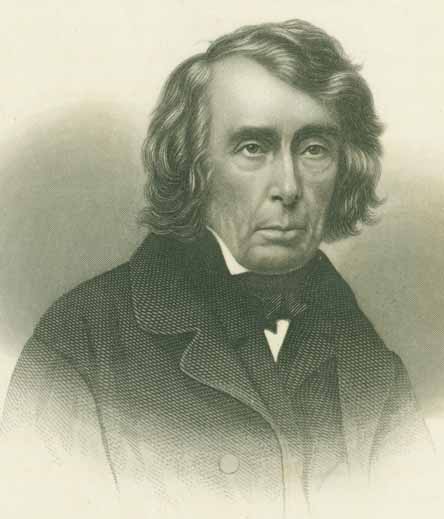
Taney, Roger B.
b. March 17, 1777, in Calvert County, Maryland; d. October 12, 1864, in Washington, D.C. Roger B. Taney was born on March
17, 1777, in Calvert County, Maryland. Taney grew up in a slaveholding, aristocratic Catholic
family in Maryland. He graduated from Dickinson College in Carlisle, Pennsylvania, in 1795 and gained admission to the Maryland
bar in 1799. That same year he was elected to the state legislature and held that position until 1800. In 1801, he moved to
Frederick, Maryland, where he continued the practice of law and in 1827, Taney was appointed Attorney General of Maryland.
In
1828, as chairman of the Democratic State Central Committee, he worked to secure Andrew Jackson’s election to the presidency,
and
in 1831, President Jackson appointed Taney as Attorney General of the United States. While in that position, Taney influenced
Jackson to veto actions granting the Bank of the United States its new charter. In 1833, Jackson appointed Taney Secretary
of the
Treasury, and it was Taney, as Treasurer, who announced that government funds would no longer be placed in the Bank of the
United
States. Upon the death of Chief Justice John Marshall in 1835, Jackson appointed Taney as Chief Justice of the Supreme Court.
Taney was Chief Justice of the Supreme Court during the famous case of Dred Scott v. Sanford (1857), and he
authored the majority opinion for the Court. In his decision, Taney declared that African Americans in the United States could
not
be citizens and therefore could not sue in a federal court. The lower federal courts had erred in accepting jurisdiction over
the
case. Furthermore, Taney argued that since Dred Scott had been born a slave, an act of Congress (the Missouri Compromise)
could
not have made him free while he resided in a territory, because Congress had no constitutional power to exclude slavery from
the
territories. The Dred Scott case exacerbated sectional differences within the United States, and many believe
that it accelerated the nation’s descent into Civil War.
Chief Justice Taney administered the oath of office to Abraham Lincoln as President of the United States in March 1861. With
the
outbreak of war, Taney was openly hostile to President Lincoln and privately believed that the federal government should not
have
used force to prevent the South from leaving the Union. In Ex Parte Merryman (1861), Taney argued that only
Congress, and not the President, could suspend the writ of habeas corpus, but his decision received bitter criticism.
Kermit Hall, ed., The Oxford Companion to the Supreme Court of the United States (New York: Oxford University
Press, 1992), 857-59; Timothy S. Huebner, The Taney Court: Justices, Rulings, and Legacy (Santa Barbara, CA:
ABC-CLIO, 2003), 32-42; Allen Johnson, ed., Dictionary of American Biography (New York: Charles Scribner’s
& Sons, 1964), 9:2:289-94; Walker Y. Lewis, Without Fear or Favor: A Biography of Chief Justice Roger Brooke
Taney (Boston: Houghton Mifflin, 1965); Mark E. Neely Jr., The Abraham Lincoln Encyclopedia (New York:
McGraw Hill, 1982), 301-2; James F. Simon, Lincoln and Chief Justice Taney: Slavery, Secession, and the President’s War
Powers (New York: Simon & Schuster, 2006). Illustration courtesy of the Abraham Lincoln Presidential
Library, Springfield, IL.